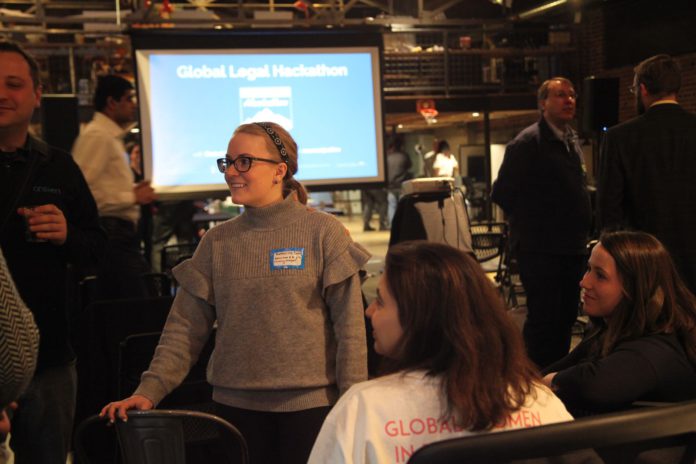
Denver was one of 11 cities in the U.S. and 40 from around the world to host a Global Legal Hackathon Feb. 23-25. The event was designed to wed technology and law in order to solve common legal “access to justice” problems. A small group gathered Feb. 23 at Legal Talk Network’s Denver offices to pitch ideas and meet other lawyers and developers to form a team, and “hack” late into Sunday night to come up with solutions to pressing legal problems.
Teams developed solutions for issues affecting either the private or public sphere, concerning the business of law or government and legal systems. For the legal systems, the competition used University of Southern California Gould School of Law professor Gillian Hadfield’s “Challenges,” which tackle 10 problems pertaining to access to and administration of justice. The problems range from privacy policy and dispute resolutions to eliminating marijuana felony records.
University of Missouri Kansas City 3L student Jon Benjamin worked on a project intended to combat online cyberstalking. He attended the Denver event in hopes of finding a team to help him develop a solution to the issue. During his pitch, Benjamin cited Department of Justice statistics that estimate there are roughly 850,000 American adults who experience unsolicited online sexual contact each year. Most stalking laws cover activities considered to be cyberstalking, he said. And although there is information available online to help people file a restraining order, Benjamin said most likely don’t want to deal with the process.
“A restraining order isn’t the answer for every situation, but I think the value proposition is that most people who are victims of this would be willing to pay a small fee but not take the time to file the paperwork for a restraining order in order to get the person to stop,” he said. “So if we can put everything together and find attorneys willing to represent them in their jurisdiction that allows the accused due process, it lowers the barriers to fighting what is a crime.”
Davis Graham & Stubbs associate Otto Hanson partnered with Sherman & Howard associate Katherine Snow to take on the issue of plain language contracting. He attended the hackathon without a team or an idea and came away with both.
Snow and Hanson chose the plain language contracting issue and pitched to several engineers. They partnered with four developers — Chad Jolly, Carlos Gochez, Nathan Benes and Jeremy Church — to create LexLucid, a contract-grading platform for consumers.
“We think this is a pretty sexy product,” Hanson said. LexLucid is an online tool that provides a rating on user agreement contracts from a consumer fairness standpoint. And although Hanson said legal jargon is often a big barrier for consumers, contracts in plain language are likely still too long and don’t provide a simple answer.
“It’s less important to get the language simpler as it is to find a way to tell consumers what they really want,” he said. “If I’m a consumer signing up to new service, all I want to know is ‘Is this fair to consumers or not? Is this the kind of company that gouges consumers and buries skeletons in their contracts, or is this a company that is as fair as possible?’”
The project won this round for the hackathon and the team will go on to compete in the next online competition.
Finalists from that round will go on to present and compete in New York City later this year. The LexLucid team worked for more than 25 hours between Friday and Sunday developing the idea and getting the site up and running.
Hanson said that complex legal language is implemented for a reason — so lawyers and contracts can be as specific and precise as possible — and he acknowledges the benefit of that. He said he thought more simple language wasn’t the only solution but rather a grade from one to five on the fairness of the contract. Examples included Airbnb and Venmo user agreements.
“I think all of us can pinpoint a time when we’ve simply clicked ‘I agree’ or had our eyes glaze over while reading a contract, so did we really understand the terms we were agreeing to?” Snow said. “Probably not — not only are contracts written at a high level, but most people don’t have the time or desire to read through what they’re agreeing to. It affects everyone across the economic strata, so it was a perfect challenge for us to tackle.”
Hanson said after the event, the team was contacted by two practicing attorneys and some developers who showed support and interest in the project.
“LexLucid has the potential to be a very powerful consumer tool,” Snow said. “It alerts users to what’s in the terms and is a platform for corporate transparency. My hope is other attorneys will consider reviewing contracts, so it can grow and become an agent of change.”
— Kaley LaQuea

